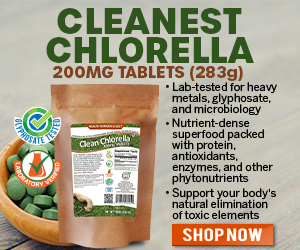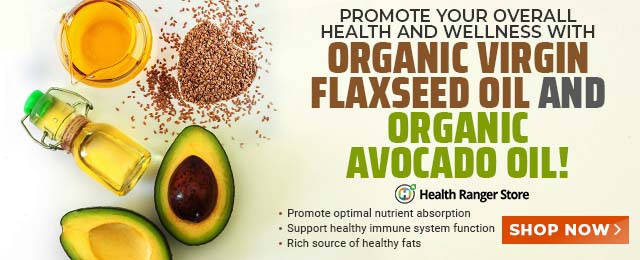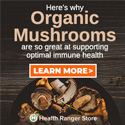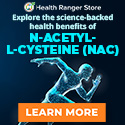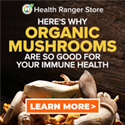
Chemical Found In Curry May Help Immune System Clear Amyloid Plaques Found In Alzheimer's Disease (press release)
Wednesday, November 22, 2006 by: NewsTarget
Tags: health news, Natural News, nutrition
- If FLUORIDE is SO GOOD for us, WHY does the packaging look like THIS?
- The Health Ranger releases “Vaccine Zombie” song and music video, using AI-animated zombies for the music video
- Israeli soldiers accused of even more torture and abuse in the West Bank
- Coriander seeds: Ancient medicine backed by modern science
- Former horse rancher and 6,000 other plaintiffs are suing Syngenta after paraquat exposure led to Parkinson's Disease
- Center for Countering Digital Hate launches BLACK OPS campaign against RFK Jr.
- When the MASS MEDIA is backing your movement, you are NOT the "RESISTANCE"
- Mike Adams releases music poetry sensation: A Child of God
- Mike Adams releases new song and music video: Nothing More Disgusting Than a Globalist
- Michigan sheriff announces criminal investigation into 2020 election crimes, Dominion Voting Systems
- EPA advisor admits the agency is funneling billions to climate groups ahead of Trump’s return to White House
- Economic treason
- Russia warns citizens against traveling to the United States, Canada and the European Union
- California's social media censorship law struck down: A victory for free speech or a threat to online safety?
- Modern science uncovers brain-boosting power of ancient spice coriander and its key compound linalool
- CONSERVATIVES SOUND THE ALARM: Big Pharma and the Left trying to force $32 billion money grab from America’s seniors into year-end spending deal
- OpenAI whistleblower who dissented against how the company trained ChatGPT found dead
- Arizona officials claim Maricopa County needs 10-13 days to tabulate results of the election
- California's social media censorship law struck down: A victory for free speech or a threat to online safety?
- The Health Ranger releases “Vaccine Zombie” song and music video, using AI-animated zombies for the music video
- Florida takes a stand: DeSantis proposes permanent ban on mRNA vaccine mandates
- Former horse rancher and 6,000 other plaintiffs are suing Syngenta after paraquat exposure led to Parkinson's Disease
- Modern science uncovers brain-boosting power of ancient spice coriander and its key compound linalool
- EPA advisor admits the agency is funneling billions to climate groups ahead of Trump’s return to White House
- Michigan sheriff announces criminal investigation into 2020 election crimes, Dominion Voting Systems
- Congratulations to the FULLY UNVACCINATED as you resisted the COVID-19 PROPAGANDA MACHINE fueled by over $100 BILLION
- Peter Rost exposes Big Pharma corruption in his book “The Whistleblower: Confessions of a Healthcare Hitman”
- House Intelligence Committee calls for the ARREST and PROSECUTION of Dr. Anthony Fauci
- Ballot drop boxes set ablaze in Oregon and Washington, prompting security concerns ahead of election
- The pandemic as a tool for INDOCTRINATION: Understanding “The Indoctrinated Brain” by Dr. Michael Nehls
- Migrants are taking advantage of recent hurricanes to scam residents and loot their homes
- Sermon 30: How Jesus reveals Caesar’s FAKE CURRENCY and FALSE AUTHORITY
- Israeli soldiers accused of even more torture and abuse in the West Bank
- Arizona officials claim Maricopa County needs 10-13 days to tabulate results of the election
- Federal judge backs Trump's mass firings, clearing path for government downsizing
- Jena Griswold “breaks” 2024 election in Colorado: Results will be 100% non-certifiable, warns Patrick Byrne
- EPA advisor admits the agency is funneling billions to climate groups ahead of Trump’s return to White House
- RFK Jr. clears key hurdle: Sen. Susan Collins backs controversial HHS nominee, signaling a new era for health policy
- Global leaders unite to clamp down on “misinformation” with UN-backed Cascais Declaration
- Congratulations to the FULLY UNVACCINATED as you resisted the COVID-19 PROPAGANDA MACHINE fueled by over $100 BILLION
- DIRTY VACCINES: Dr. Anthony "Fraudulent" Fauci, King of the Covid scamdemic, admits "We don't do placebo trials on vaccines"
- The Health Ranger releases “Vaccine Zombie” song and music video, using AI-animated zombies for the music video
- Democrats cry as “liberal supply chains” are wiped out and their favorite multi-billion dollar money machine is shut down
- Fake "CLIMATE CHANGE" will continue to devastate any regions the globalists and ruling elite want to purchase at a discounted price
- Mint: The ancient herb that refreshes, soothes and heals
- PBS shutters DEI office in wake of Trump’s executive order
- South Korean banks halt silver bar sales amid global and domestic uncertainty
- “Cancer Gag Act” threatens farmers’ rights and public health: A dangerous push for corporate immunity
- James V. DeLong’s book “Out of Bounds, Out of Control” provides a gripping tale of how the EPA operates outside the rule of law
- Trump administration takes on global censorship: A new frontier for free speech advocacy
- Trump's impressive political comeback against all odds makes headlines around the world
- The pandemic as a tool for INDOCTRINATION: Understanding “The Indoctrinated Brain” by Dr. Michael Nehls
- Deep State Power Grab? Corporate Transparency Act threatens nonprofits and small businesses – Andy Schlafly discusses potential impacts with Mike Adams
- Kyiv plans to recruit 160K soldiers amid mounting cases of DESERTION in Ukrainian military
- Red Cross issues warning to stop blood plasma donations from vaccinated people
- Scientists confirm: GENIUS brain function can be spontaneously unleashed in humans without any apparent cause
- HYSSOP: What research reveals about the health benefits of this ancient holy herb
- EPA advisor admits the agency is funneling billions to climate groups ahead of Trump’s return to White House
- Two containers with completed ballots fall out of truck in Florida
- Fully vaccinated about to see “tsunami” of illness and death, warns virologist
- Today I asked our AI language model “Neo” about which phytonutrients or phytochemicals can block the spike protein related to SARS-CoV-2 … Here is what it answered…
- Global leaders unite to clamp down on “misinformation” with UN-backed Cascais Declaration
- DATA: England’s vaccinated population had close to one million deaths in 23 months; unvaccinated population had less than 61,000 deaths over the same period
- BREAKING: 2025 NDAA authorizes mandatory military draft of WOMEN across America… as Pentagon pursues global NUCLEAR war with both Russia and China at the same time
- ENGINEERED FAMINE: Oregon starts SHUTTING DOWN small farms “to protect the people”
- Michael Yon warns of a ZIONIST TAKEOVER in Trump’s second administration
- Ozempic and Wegovy weight loss drugs are injectable LIZARD VENOM PEPTIDES that may unleash a devastating wave of organ failure… side effects align with symptoms of SNAKE BITES
- NASA admits that climate change occurs because of changes in Earth’s solar orbit, and NOT because of SUVs and fossil fuels
- These 13 countries just signed an agreement to engineer a global FAMINE by destroying food supply
- BOMBSHELL: DNA testing kits are a SCAM to develop ethnic-specific bioweapons
- Careless Whisper: AI-powered transcription tool being used by hospitals found to invent chunks of text no one ever said
- BBC staffers accuse media outlet’s executives of instituting bias in Gaza coverage, claiming favorable treatment of Israel
Using blood samples from six Alzheimer's disease patients and three healthy control patients, the researchers isolated cells called macrophages, which are the immune system's PacMen that travel through the brain and body, gobbling up waste products, including amyloid beta.
The team treated the macrophages with a drug derived from curcumin for 24 hours in a cell culture and then introduced amyloid beta. Treated macrophages from three out of six Alzheimer's disease patients showed improved uptake or ingestion of the waste product compared to the patients' macrophages not treated with curcumin. Macrophages from the healthy controls, which were already effectively clearing amyloid beta, showed no change when curcumin was added.
"Curcumin improved ingestion of amyloid beta by immune cells in 50 percent of patients with Alzheimer's disease. These initial findings demonstrate that curcumin may help boost the immune system of specific Alzheimer's disease patients," said Dr. Milan Fiala, study author and a researcher with the David Geffen School of Medicine at UCLA and the VA Greater Los Angeles Health Care System. "We are hopeful that these positive results in a test tube may translate to clinical use, but more studies need to be done before curcumin can be recommended." The patients ranged in age from 65 to 84. Fiala noted that the patients whose immune cells responded were younger and had higher scores on a Mini-Mental State Examination suggesting that curcumin may help those with less advanced dementia. Some of the patients may have already had additional curcumin in their systems due to participation in another UCLA study, which may have impacted findings.
"Our next step will be to identify the factors that helped these immune cells respond," said Laura Zhang, a study author and a UCLA/VA research assistant in Fiala's lab.
Fiala noted that the method researchers used to test the immune cell response of macrophages may provide a novel way of evaluating the effectiveness of drugs in clearing amyloid beta from the brain and may help to individualize Alzheimer's disease treatment.
According to Fiala, macrophages are the soldiers of the innate immune system -- the part of the immune system which is present at birth. Curcumin may support the body's natural immune fighting function in directly helping macrophages clean away amyloid-beta. The treatment of macrophages with curcumin is radically different from some of the vaccine approaches currently being studied.
The study was funded by the Alzheimer's Disease Association and private donors. The curcumin derived drug was provided by the Sabinsa Corporation, a company that manufacturers phytonutrients and specialty chemicals for nutritional, pharmaceutical and food industries. Fiala participated in a speaking engagement for Sabinsa.
Other study authors include: Michelle Mahanian, Justin Zaghi and Mark Rosenthal from the Department of Medicine, Veterans Affairs Greater Los Angeles Healthcare System and David Geffen School of Medicine at UCLA; John Cashman of the Human BioMolecular Research Institute, San Diego; James Sayre of the Department of Biostatistics, UCLA School of Public Health; Araceli Espinosa of the UCLA Department of Neurobiology; Vladimir Badmaev, Applied Pharmacology, Sabinsa Corporation, New Jersey; Michael C. Graves, UCLA Department of Neurology; and George Bernard, UCLA Department of Neurology and Division of Oral Biology and Medicine, UCLA School of Dentistry.
Source: University of California - Los Angeles
Health news at FETCH.news
Get independent news alerts on natural cures, food lab tests, cannabis medicine, science, robotics, drones, privacy and more.
Take Action: Support Natural News by linking to this article from your website
Permalink to this article:
Embed article link: (copy HTML code below):
Reprinting this article:
Non-commercial use OK, cite NaturalNews.com with clickable link.
Follow Natural News on Facebook, Twitter, Google Plus, and Pinterest
Science News & Studies
Medicine News and Information
Food News & Studies
Health News & Studies
Herbs News & Information
Pollution News & Studies
Cancer News & Studies
Climate News & Studies
Survival News & Information
Gear News & Information
News covering technology, stocks, hackers, and more



"Big Tech and mainstream media are constantly trying to silence the independent voices that dare to bring you the truth about toxic food ingredients, dangerous medications and the failed, fraudulent science of the profit-driven medical establishment.
Email is one of the best ways to make sure you stay informed, without the censorship of the tech giants (Google, Apple, Facebook, Twitter, YouTube, etc.). Stay informed and you'll even likely learn information that may help save your own life."
–The Health Ranger, Mike Adams











